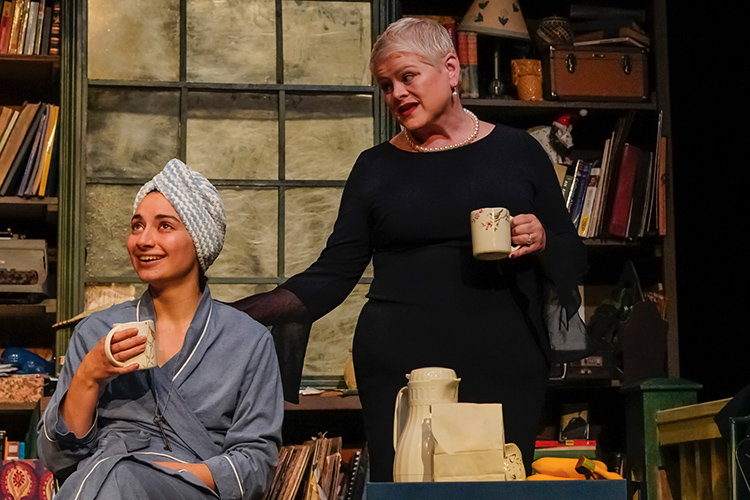
By Sandi Masori

SAN DIEGO—- San Diego is so lucky when it comes to theater. We have so many theaters, both professional and community, so there’s almost always a show to see.
And so it was that I found myself making my way through downtown to the East Village to a new-to-me venue, the Backyard Renaissance Theater on 10th Avenue, to see a show called Proof.
The theater itself is really cute and very intimate. It only seats 98 people. The area around it isn’t great and there’s not really anything to eat there, or anywhere to hang out before the show, so you’ll want to eat in a different area and come to the theater only about 15-20 min before show time. There’s a paid lot on the opposite corner for parking.
The current production, Proof is written by David Auburn, who though raised Unitarian, had a Jewish mother. The title might make you think you’re going to see a show about a legal drama, or infidelity, but in this case the word refers to higher level math. Catherine (Liliana Talwatte) is mourning her mathematician father Robert (Francis Gercke) who has recently passed after she took care of him through several years of mental illness. Her sister Claire (Wendy Maples) comes in from New York for the funeral and wants to bring Catherine back with her. Also in the mix is Catherine’s love interest Hal (William Huffaker) who comes to look through Robert’s old papers in search of exciting unpublished math proofs.
Robert appears both as a ghost or figment or Catherine’s imagination and also through flashbacks when she is remembering times before his passing. It was a little confusing to figure out when he was a figment and when it was a flashback. Perhaps a little bit of different mood lighting could’ve helped distinguish between those scenes.
There were plenty of math jokes and terms that probably would make any mathematician’s heart sing but many sailed over my head. It didn’t diminish the show though. The drama kept the audience engaged even if they were liberal arts majors who haven’t done math since high-school.
Talwatte and Maples gave compelling performances as sisters at odds going through a family crisis. The set was really cute making clever use of a small, open stage. Since there were no curtains, scene changes were marked by the lights going on and off and actors walking off stage and coming back on in different clothes. The set was a little confusing though, as at first I thought it was a very well-designed living room, complete with touches of looking live-in like lamps with crooked covers, books arranged haphazardly in the bookshelves and other subtle touches that showed great attention to detail.
In the second half of the show, as the actors kept referring to “outside” and “inside” it seemed that this was not a living room, but a porch of sorts. As the play is set in Chicago, I was confused how people would have little lamps and books on their porch. Perhaps in the Midwest indoor porches are a thing? I don’t know. It was probably just needing to be creative with how they used the small stage that led the same set to seem to have multiple purposes, but it was a little confusing.
Notwithstanding the set confusion, the play was enjoyable, and left the audience satisfied. The show runs through December 9, and even if you aren’t able to catch this show, keep your eye on the theater, now in its eighth season, as it seems they’re putting out some fine work.
*
Sandi Masori is a food and theatre reviewer for San Diego Jewish World. When she’s not covering food or theatre, she helps authors self-publish, hangs out with her kids, and searches for the best sushi in town.